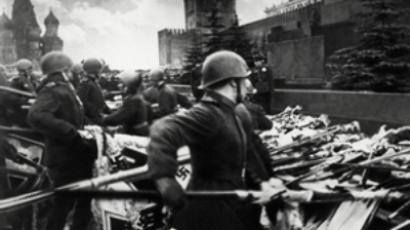“Recognizing Nazism and Communism as a common legacy is outrageous”
A recent resolution inspired by the Baltic States has called for Europe to recognise Communism and Nazism as equal phenomena, the idea of which to prominent Jewish historian Efraim Zuroff is outrageous, he told RT.
RT: In July the parliamentary assembly of the OSCE passed a resolution comparing Stalinism and Nazism. This is insulting not only to Russia, but also to many in the western world. Why was such a resolution passed?
Efraim Zuroff: The resolution was passed because of the campaign that has been initiated by the Baltic countries, but which also has the support of other post-Communist countries to try and equate Communism and Nazism. To put it into practical terms, they are basically saying that the two phenomena are equal and the victims deserve the same recognition and the same compensation. And what they are trying to say is that the Holocaust is not unique.
RT: Why are they not the same?
E.Z.: They are not the same because first of all, the crime of Nazism was genocide – that was a deliberate attempt to totally destroy a people, to wipe them off the face of the earth, and that was never the case as far as the crimes of Communism are concerned. The Communist regime carried out some very terrible crimes in different countries that were either part of the Soviet Union or under Communist domination, but there never was an intention to destroy an entire people.
RT: The campaign to equate Fascism and Communism is being waged predominantly by Estonia, Latvia and Lithuania – it started when they gained independence and the campaign recently gained momentum. What is behind it?
E.Z.: I think it should be clear that countries like Lithuania, Latvia and Estonia – where there was a high percentage of local collaborators with Nazis – would obviously prefer to be perceived by the public as victims rather than perpetrators. So just that alone is reason enough for a campaign like this. Now, I think it’s entirely legitimate to want recognition for the suffering of their own people from the communists but that doesn’t justify creating a historically inaccurate symmetry and trying to get a certain degree of recognition that those crimes don’t necessarily deserve.
RT: You’ve mentioned that they are trying to present the Holocaust as not a unique event – but is it as simple as that?
E.Z.: It is much more serious, quite frankly. As long as the Holocaust is a unique phenomenon, those events would get a lot more attention and interest and naturally, part of that story which was the extensive collaboration of Baltic peoples with the Nazis will receive quite great attention – which the Balts would prefer that they not get.
If these countries since the independence of 1991 had really made a serious effort to bring the local collaborators to justice – those who had not been prosecuted, because many were prosecuted right after the Second World War by the Soviet regime for example – if they had made a serious effort to teach the truth about what happened in those countries, then I think they would not feel such an urgent need to try to divert attention from the Holocaust. There has not been a single Lithuanian, Latvian or Estonian who has been punished in the independent Lithuania, Latvia or Estonia for Holocaust crimes.
RT: Is it not possible that part of their motivation for this campaign is to cover up their guilt?
E.Z.: Well there’s no question! Because if you dislodge the Holocaust from its unique status, that will reduce the interest and research and study of those events, and the less said and studied about those events the better for the Baltics it will be. It’s a double failure: it’s a failure during the Holocaust and it’s a failure since independence.
RT: Why is all of this happening in the Baltic States? What is the difference between the Baltic States and other former communist countries?
E.Z.: There is support in other communist countries for this, but you have to understand this is an Eastern European phenomenon and part of that relates to historical circumstances, because the collaboration with the Nazis in Eastern Europe was different and qualitatively much more lethal than the collaboration of locals with the Nazis in other parts of Europe. French police, or Dutch, or Belgian police did not murder their own Jews, for a variety of reasons, but in Eastern Europe this was not true. There many of the people were incorporated by the Nazis in the killing mechanisms.
RT: They were victims of communism, as you say, and they have a legitimate right to be remembered. How can they be remembered in a way that does not take away from the remembrance of the Holocaust victims?
E.Z.: First of all, commemorating the victims of communism in no way lessens the importance of the Holocaust. The problem begins when you are trying to create symmetry, as if the two phenomena were the same. If they succeed in having August 23 declared as a joint day of commemoration for the victims of Nazism and Communism – what's the next step? The next would be to cancel the special day to remember the Holocaust because why do you need to have a special day to remember the Holocaust if you have a day that's more inclusive? Individual countries can choose special days for their own national days of mourning which is already the case. But what they are basically saying is – we want Europe as a continent to make a statement and the wording of the declaration passed in June 2008 is especially problematic because one of the things that they say there is that Europe will never truly be reunited until they recognize Nazism and Communism as a common legacy. That’s outrageous, that’s absolutely outrageous! But that’s what they are trying to do. And it’s high time that people start paying attention and realizing that the next thing we know is that we will be facing a battle to fight against distorted WWII narrative.
RT: Why is the rest of the world remaining so quiet?
E.Z.: So far all these initiatives are in the, so-to-say, declaratory phase. There’s no implementation yet – this is very important – which makes it so urgent to stop it now. Once this passes legislation – though it is not clear whether this would happen – this depends on countries like Germany and France and England and other EU members who see this quite differently than do the peoples in Eastern Europe. All of this is taking place under the radar and the only country paying any attention to this is Russia, and Russia alone can’t stop it.














